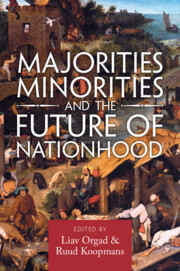Book contents
- Majorities, Minorities, and the Future of Nationhood
- Majorities, Minorities, and the Future of Nationhood
- Copyright page
- Contents
- Figures
- Tables
- Contributors
- Preface
- Acknowledgments
- A Note on the Cover
- 1 Majority–Minority Constellations
- 2 Are There Any Cultural Majority Rights?
- 3 Identity Not Culture
- 4 Nationhood, Multiculturalism, and the Ethics of Membership
- 5 Reconciling the Cultural Claims of Majorities and Minorities
- 6 Linking Minority Rights and Majority Attitudes
- 7 The Liberalism of Fear
- 8 Multiculturalism without Privileging Liberalism
- 9 Why Every Nation Should Nurture (a Thick and Inclusive) Nationalism
- 10 Populism and Cultural Majority Rights
- 11 Legitimate Populism and Liberal Overreach
- 12 The Causes of Populism and the Problem of Cultural Majority Rights
- Index
- References
5 - Reconciling the Cultural Claims of Majorities and Minorities
Published online by Cambridge University Press: 12 November 2022
- Majorities, Minorities, and the Future of Nationhood
- Majorities, Minorities, and the Future of Nationhood
- Copyright page
- Contents
- Figures
- Tables
- Contributors
- Preface
- Acknowledgments
- A Note on the Cover
- 1 Majority–Minority Constellations
- 2 Are There Any Cultural Majority Rights?
- 3 Identity Not Culture
- 4 Nationhood, Multiculturalism, and the Ethics of Membership
- 5 Reconciling the Cultural Claims of Majorities and Minorities
- 6 Linking Minority Rights and Majority Attitudes
- 7 The Liberalism of Fear
- 8 Multiculturalism without Privileging Liberalism
- 9 Why Every Nation Should Nurture (a Thick and Inclusive) Nationalism
- 10 Populism and Cultural Majority Rights
- 11 Legitimate Populism and Liberal Overreach
- 12 The Causes of Populism and the Problem of Cultural Majority Rights
- Index
- References
Summary
Many responses to the resurgence of “majority nationalism” assume that that there is nothing normatively significant to the claims of national majorities. They accordingly seek to blunt the force those claims – or simply redescribe them in ways that do not account for majority nationalists’ central commitments or concerns. The very arguments used to ground minority rights in Kymlicka’s works appear to equally justify at least some majority cultural rights. Where a group possesses majority status by reasonably benign means and yet faces threats to its culture through the operation of, for example, globalization, Kymlickean arguments for minority rights grounded in cultural vulnerability equally justify majority cultural rights. In “Nationhood, Multiculturalism, and the Ethics of Membership,” Kymlicka presents justice-based reasons to think that majority rights claims should nonetheless be neutralized. Yet his arguments assume that majority and minority rights claims will only be made within the boundaries of a nation-state and that rights recognition in those circumstances will be a “zero sum” game. This assumption too is unwarranted in a globalized world. The issue of majority rights claims is at least more complicated than what Kymlicka allows.
Keywords
- Type
- Chapter
- Information
- Majorities, Minorities, and the Future of Nationhood , pp. 129 - 150Publisher: Cambridge University PressPrint publication year: 2022
References
- 2
- Cited by

